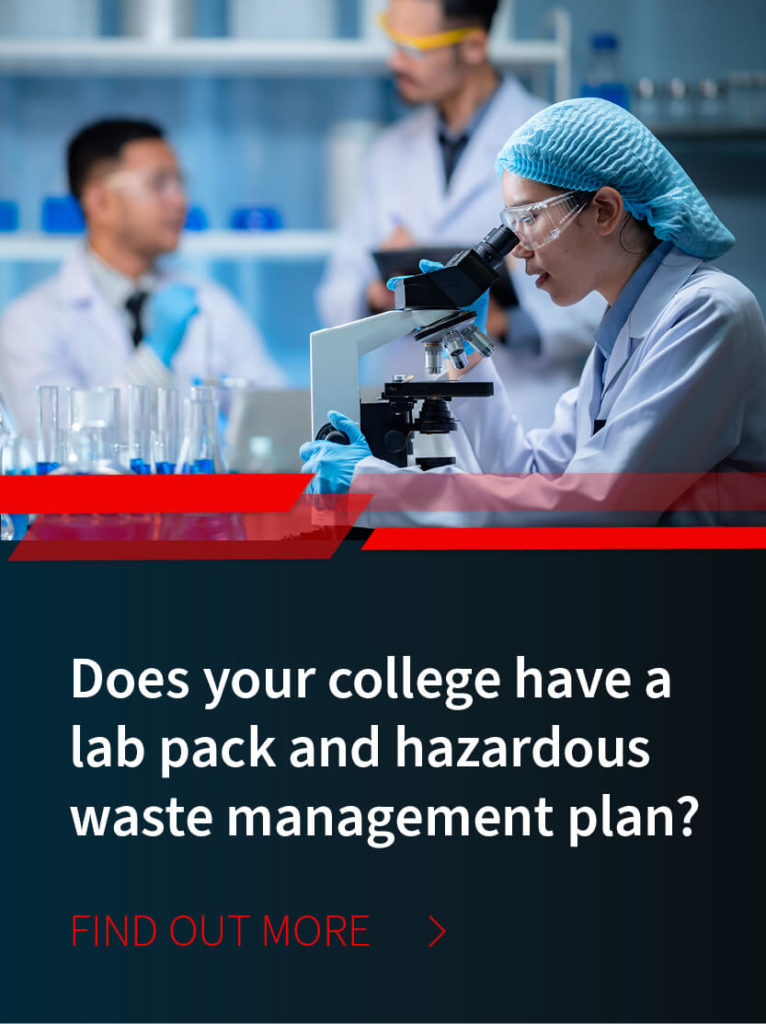
/ IN THIS BLOG
Colleges and universities are centered around education, research, and campus life, but beyond those priorities, many institutions are also managing hazardous waste, often across dozens of departments. From chemistry labs and research facilities to maintenance shops and art studios, institutions of higher education are often juggling some of the most varied types of hazardous waste. That means the potential for mishandled chemicals and regulatory violations is high, especially if a school doesn’t have a formal management system in place which is consistently followed.
Colleges must meet strict EPA, RCRA, DOT, and OSHA regulations, and failure to do so can result in costly fines, safety risks, and repetitional damage. And unlike a single-location business, colleges often face the added complexity of multiple campuses, hundreds of staff members, and rotating student users.
The good news is that with the right approach, colleges can implement a clear, compliant hazardous waste program that protects both people and the environment. When Pell City High School in Alabama found itself overwhelmed by outdated lab chemicals, it turned to MCF Environmental Services. With help from a tailored lab pack service and hands-on support, the school eliminated risks and brought its chemical inventory under control, without interrupting daily operations.
Learn the key steps to building a safe and compliant hazardous waste management system for your college or university. By developing a practical process, you can take the fear and uncertainty out of hazardous waste and build a system everyone in your school can depend on.
01 / Step 1: Start with a Written Plan
Every effective hazardous waste management system begins with a written plan. This document outlines the who, what, when, where, and how of your campus waste processes. It should identify key personnel, define departmental responsibilities, and describe step-by-step procedures for proper storage, labeling, segregation, and disposal.
A written plan serves as the foundation for training, compliance checks, and internal accountability. It also shows regulatory agencies that your institution takes hazardous waste seriously. Colleges that fail to document their waste management strategy often struggle with inconsistent practices across departments, leading to violations and safety risks.
Your plan should be a living document, updated regularly as regulations change or new facilities come online.
02 / Step 2: Identify Waste Streams Across Campus
Proper waste identification is one of the most critical, and commonly overlooked, steps in a college hazardous waste management system. Lab chemicals, maintenance products, cleaning agents, spent bulbs, batteries, paints, and even expired medications can all fall under hazardous or universal waste classifications.
Each campus department may generate different types of waste, from the science labs and art studios to custodial services and facilities management. Without clear identification, hazardous materials may be mislabeled or improperly stored, putting your institution at risk of citations or accidents.
Start by reviewing Safety Data Sheets (SDS) for all materials in use and compare against EPA hazardous waste criteria. If there’s uncertainty, laboratory analysis may be required. Properly categorize each stream and assign the correct regulatory codes before storage or transport.
At Pell City High School, MCF conducted a full chemical inventory to uncover all waste types present. That level of clarity helped ensure correct packaging, labeling, and transport. Colleges must take a similar approach as comprehensive identification helps prevent dangerous mix-ups and supports regulatory compliance from the start.
03 / Step 3: Determine Your EPA Generator Status
Once waste types are identified, colleges must assess how much hazardous waste is generated each month. The Environmental Protection Agency (EPA) assigns generator status based on quantity, which directly impacts storage limits, transportation rules, and reporting obligations.
The three main categories are:
Conditionally Exempt Small Quantity Generator (CESQG): Less than 220 pounds/month
Small Quantity Generator (SQG): 220–2,200 pounds/month
Large Quantity Generator (LQG): More than 2,200 pounds/month
Generator status can vary across campuses or departments, depending on volume and frequency. For example, a research lab may push a university into SQG or LQG status even if other departments generate minimal waste.
Failing to track waste accurately can lead to misclassification, resulting in violations and EPA fines. It also affects how long waste can be stored. LQGs, for instance, must ship hazardous waste every 90 days.
Colleges and universities with research or teaching laboratories may also qualify for special regulatory provisions under EPA’s Subpart K rule, outlined in 40 CFR part 262. Subpart K offers eligible institutions added flexibility around how and where on-site waste determinations are made, provided they maintain a Laboratory Management Plan and ensure that waste decisions are made by trained professionals, not students.
This rule also incentivizes safe chemical management by encouraging timely removal of expired or potentially dangerous substances. While optional, Subpart K can help academic institutions streamline compliance without compromising safety or oversight.
04 / Step 4: Use Approved Containers and Labels
Proper storage is also a regulatory requirement that can’t be overlooked. Once hazardous waste is generated, it must be stored in containers that meet Department of Transportation (DOT) standards. These containers should be compatible with the waste type, clearly labeled, and kept closed except when waste is being added.
Common labeling mistakes, like missing accumulation start dates, incorrect hazard descriptions, or generic names, can result in serious compliance violations during inspections.
Every container should include:
The words “Hazardous Waste”
Accumulation start date
Detailed contents
Hazard class and waste codes (when known)
At Pell City High School, MCF provided tailored lab packing services to ensure that chemical waste was safely containerized and labeled according to DOT and EPA regulations. Colleges with multiple buildings or campuses benefit from similar hands-on support to train staff, streamline labeling practices, and prevent violations.
05 / Step 5: Coordinate Collection, Storage, and Transportation
After proper labeling and containment, hazardous waste must be collected, stored, and shipped according to strict timelines based on the generator status of your college or university. Large Quantity Generators (LQGs) have just 90 days to ship hazardous waste off-site, while Small Quantity Generators (SQGs) typically have 180 days.
Storage areas should be:
Secure and clearly marked
Inspected weekly
Located away from drains or ignition sources
Transportation must be handled by a licensed hazardous waste hauler, with documentation such as the Uniform Hazardous Waste Manifest completed for each shipment. Colleges that lack in-house compliance expertise often benefit from partnering with an experienced vendor like MCF Environmental Services.
At Pell City High School, MCF managed every aspect of the disposal process, including scheduling and logistics, despite construction delays at the school. This same coordination model can be scaled for colleges with high waste volume or decentralized campuses, ensuring safe and timely transportation.
06 / Step 6: Maintain Records and Documentation
Colleges must retain comprehensive hazardous waste documentation to remain in compliance with EPA, RCRA, and DOT regulations. This includes:
Manifest and shipping records for each waste shipment
Training records for all personnel handling hazardous waste
Inspection logs for storage areas
Waste determinations and lab analyses
EPA ID application records and correspondence
Documentation isn’t just about avoiding fines, it also proves your institution is taking waste management seriously and acting responsibly. During an inspection, missing paperwork is one of the fastest ways to incur violations, even if your physical practices are sound.
MCF Environmental Services, for example, helps colleges organize and maintain these records. By offering cradle-to-grave support, we ensure each client has access to all required documentation, easing the burden on administrative staff and reducing audit anxiety.
07 / Step 7: Train Staff and Faculty
No hazardous waste management system can succeed without knowledgeable people behind it. Colleges must ensure that all employees who generate, handle, store, or manage hazardous waste receive regular, documented training.
Training should cover:
Hazardous waste identification and segregation
Labeling, storage, and container management
Emergency procedure and spill repsonse
Proper use of PPE and safety equipment
Regulatory compliance (EPA, DOT, OSHA)
Lab technicians, faculty, maintenance staff, and campus safety officers may all be involved in hazardous waste handling at some point. Regular training empowers them to work safely and recognize potential compliance issues before they become violations.
MCF Environmental Services works directly with educational institutions to provide clear, customized training and support. For Pell City High School, MCF’s team coordinated closely with school administrators to ensure everyone involved understood the process and felt confident in the lab pack procedures and safety protocols.
08 / Step 8: Partner with a Qualified Waste Service Provider
Even with a strong internal system in place, most colleges and universities still need the resources, experience and insight of an external waste management team. A full-service provider offers on-site guidance along with managing hazardous waste pickup, transportation, treatment, and disposal. It’s important to choose a reliable waste management partner that follows all safety rules and regulations so your organization does not encounter violations. The right team should also be there to provide technical expertise, regulatory knowledge, and the logistical support needed to stay compliant and efficient. That becomes especially necessary when departments are juggling teaching schedules, research, and administrative demands.
The right partner should offer:
Support for lab pack services and complex chemical inventories
Access to permitted treatment, storage, and disposal facilities (TSDFs)
Manifest and documentation support
Emergency response capabilities
Transparent communication and responsive service
MCF Environmental Services regularly partners with educational institutions to deliver comprehensive hazardous waste solutions. Take Pell City High School as an example. After reaching out through MCF’s website, the school received hands-on support starting with a full chemical inventory. MCF assigned a dedicated team member to lead the project and developed a lab pack plan tailored to the school’s specific materials and timelines.
Despite logistical challenges, including ongoing construction on campus, MCF coordinated directly with school administrators to complete the project safely and efficiently. The result was a fully compliant disposal process that eliminated risks and let the school continue operating without disruption.
Whether it’s a K–12 district, a college campus, or a large university system, MCF meets each institution where it is, offering full-service support from waste profiling to pickup, documentation, and regulatory reporting.
Build a Safe, Smarter Campus Waste Program
Establishing a hazardous waste management system protects students, staff, and the broader community. From science labs and maintenance closets to art studios and healthcare training facilities, colleges generate a wide variety of hazardous materials. Without a practical, well-organized system in place, the risks can quickly multiply.
By identifying waste streams, training staff, choosing compliant containers, and tracking generator status, colleges can lay the groundwork for safe and legal disposal. But the real key to long-term success is having the right partner.
MCF Environmental Services supports schools at every stage of the process, from initial audits to ongoing pickups and regulatory reporting. Whether your campus is just getting started or needs to overhaul an outdated system, MCF brings decades of experience and tailored solutions to meet your needs.
Ready to build a program that safeguards your campus and keeps you compliant? Contact MCF Environmental Services to start your customized college hazardous waste strategy today.
Robert Losurdo
President, COO








